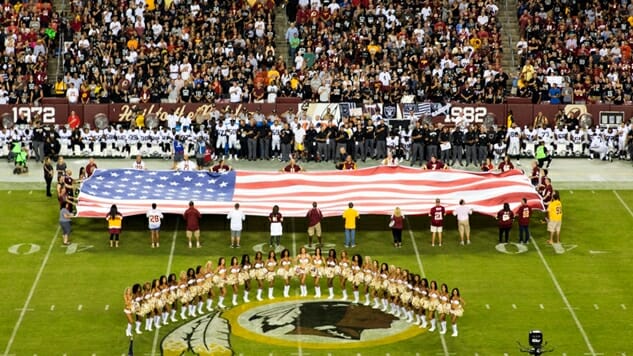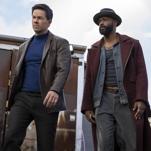The NFL’s Broken Politics Embody the Ideology of “Centrist” Apoliticism
Photo by Tasos Katopodis/Getty
Anyone who claims to have political beliefs that are not political either doesn’t understand politics, or understands them very well—and is pulling a sleight of hand designed to make their beliefs look like the default status quo. This has been embodied in D.C. “centrism” finally being called out for the ideology that it is, where “center-right” and “center-left” folks largely just want to “come together” to enact, well…hyper-corporatist policies it turns out. The “center” of major American politics has largely described itself as apolitical, and thus, is the supposed natural destination for all political debates on both the left and the right. For example, “the rational center” is a self-flagellating phrase which rose in prominence in think tanks over the last century. The best thing to come out of Donald Trump’s stunning election is this country’s ruling class being universally exposed as the ideologues that their stated policies prove them to be.
Which brings us to the NFL, where many team owners and the D.C. ruling class are one and the same. No one is more in favor of the status quo than the self-described “Shield.” The NFL has always held itself up as a paragon of virtue—a place where patriotic Americans can set aside their differences and escape a world poisoned by politics to cheer one bereft of it.
As Ray Rice’s domestic violence saga exposed for all to see, not everyone can view sports as the escape that so many straight white men like myself want it to be. Jovan Belcher shot the mother of his infant child nine times in front of his own mother, then drove to the Kansas City Chiefs parking lot and shot himself in the head in front of the Chiefs general manager, head coach and his linebacker coach. As much as the NFL wants to, you can’t just sweep this stuff under the rug and pretend that the country’s problems with mental health, guns and domestic violence (among many others) do not extend to the NFL.
Colin Kaepernick’s protest proved once and for all that the NFL does indeed have a political agenda. Squeezing mountains of cash out of America’s hyper-nationalism is the name of the game—not football—and a quarterback who is very clearly good enough to play in a league with very few good quarterbacks not doing that is proof that the NFL will not hesitate to let a political agenda take precedent over their precious “meritocracy.” If you still believe that Kaepernick isn’t good enough to play in the NFL, answer me this:
One of these two players is 2016 Colin Kaepernick in 12 games (his last year in San Francisco). The other is 2017 Jimmy Garoppolo in a six-game stretch that earned him the richest overall contract in NFL history. Both came on bad San Francisco 49er teams. Which one is which?
Player A: 59.2 completion percentage, 7.3 yards per attempt, 16 TD, 4 INT, 90.7 QB Rating
Player B: 67.4 completion percentage, 8.3 yards per attempt, 7 TD, 5 INT, 96.2 QB Rating
If you hesitated at all, that’s proof that Kaepernick belongs in the NFL (he’s player A, and, well, he does belong in the NFL). I wrote a column at the beginning of the year highlighting how absurd it is that a mediocre quarterback who was one play away from winning a Super Bowl six years ago isn’t playing in an extremely mediocre (quarterback) league. The piece was sparked by my anger which arose from watching my beloved Denver Broncos start a bunch of nobodies on a team that was two years removed from a championship.
It was patently obvious to everyone watching the preseason that Kaepernick was far superior to the three-headed hydra of Trextonock Lynchianweiler that would come to ruin my team’s season, but apparently the all-time great quarterback currently running the Broncos, John Elway, didn’t get the memo. Now he’s stuck between throwing ~$30 million dollars a year at an aggressively mediocre Kirk Cousins (Kaep made $14 million in 2016) or taking a swing at this year’s draft class with the fifth overall pick—delivered to him by three quarterbacks that he drafted (it’s great being a Broncos fan right now, just great).
Last year, more of the league took up the spirit of Kaepernick’s protest and exposed the NFL’s extremely political priorities in the process. The drama surrounding the quarterback class being analyzed by Elway and the seemingly infinite number of quarterback-needy teams is a fitting sequel to a season defined by dissent and the tone-deaf responses to it.
Lamar Jackson
The NFL is an inherently racist institution (in the same way that America is an inherently racist institution which built itself on the backs of slaves and on the graves of the natives), and this is exemplified through the control that it has over the sport’s most important position: quarterback. Roughly 70% of the players in the league are African American, but only eight teams started black QB’s all of last year (25%). The NFL’s first Super Bowl winning African American quarterback didn’t come until Doug Williams and the Washington Redskins beat the Denver Broncos in 1988. One African American quarterback has been elected to the Hall of Fame—Warren Moon—and he had to begin his career in the Canadian Football League, spending his first five seasons with the Edmonton Eskimos.
Quarterback is not the only position where a racist dynamic takes root. For years, middle linebacker was the provenance of white men thanks to the fact that they are the quarterback of the defense, and coaches were worried whether African Americans could handle calling plays and leading men. The NFL also harbors racist attitudes towards white players at certain positions. For example, Heisman Trophy nominee Christian McCaffrey was the first white running back taken in the first round of the NFL draft in 40 years, and he is the only white starting running back in the NFL (compared to 24 white quarterbacks).
Quarterback is an insanely difficult and hyper-analytical position—akin to doing brain surgery in the middle of a demolition derby—and America’s racist tropes are exemplified through the “athletic vs cerebral” debates which still extend to this very day (this dynamic extends throughout all sports: black players are described by their physical gifts, while white athletes are depicted through their mental acuity).
Bill Polian is one of the greatest general managers in NFL history. He built the Buffalo Bills of the 1990s who went to (and lost) four straight Super Bowls, took the expansion Carolina Panthers to the NFC Championship in their second season, and he oversaw the Peyton Manning era in Indianapolis. He now works for ESPN, and was asked about the most polarizing quarterback prospect in the 2018 NFL Draft: Lamar Jackson.
Jackson won the Heisman Trophy at Louisville as the nation’s best college player, and he is an electrifying athlete (I call him Reggie Bush in a quarterback’s body) who has really focused on the intricacies of quarterback play over the last season. However, Polian doesn’t see him as a quarterback. As he said on Golic and Wingo:
“I think [he’s a] wide receiver. Exceptional athlete, exceptional ability to make you miss, exceptional acceleration, exceptional instinct with the ball in his hand, and that’s rare for wide receivers. That’s [Steelers wideout Antonio Brown] and who else, name me another one who’s like that, right? Julio [Jones] is not like that. This guy is incredible in the open field and [has] a great ability to separate and, again, he’s short and a little bit slight and clearly, clearly not the thrower that the other guys are. His accuracy isn’t there, so I would say, don’t wait to make that change, don’t be like the kid from Ohio State [Terrelle Pryor] and be 29 when you make the change.”
“He’s short” is where Polian’s bias is given away. Height is a legitimate concern for NFL quarterbacks, as it’s hard to read a defense if you can’t see over your mammoth offensive linemen, but height is not a problem for Lamar Jackson. Well, if it is, it’s also a problem for two of the three best quarterbacks on Earth. Aaron Rodgers and Drew Brees are shorter than Lamar Jackson. Russell Wilson is too, and those three quarterbacks have a 3-1 record in Super Bowls. Polian isn’t the only one who believes this, as NFL.com reported that some teams asked Jackson to run wide receiver drills at the combine (Jackson denies this and says he’s just a quarterback, but those requests are made through the league, not Jackson, so it’s possible he didn’t know).
Josh Allen
The racism surrounding Jackson’s draft status is only obvious thanks to another prospect with an intriguing athletic build but dubious refined skills. Athletes at quarterback like Jackson typically have trouble playing in a hyper-organized NFL system because they are used to freelancing in college, and NFL coaches are totalitarians who demand that every miniscule aspect of their offense run “on schedule.” However, Jackson is not your typical wiry athlete trying to make his way at quarterback. He played under a certified offensive genius at Louisville in Bobby Petrino, and the system he learned in college uses the same terminology and conceptual offensive system as the New England Patriots. If you’re making the case that Jackson is like other Heisman Trophy winning QB’s who couldn’t cut it in the NFL, then you’re missing a crucial aspect of what made Lamar Jackson so great in college. He played in a legitimate NFL-style system. Saying that he can’t handle the mental rigors of reading NFL defenses is telling on yourself.
Josh Allen is a big, rocket-armed quarterback. He played in relative obscurity at Wyoming against talent that is literally in a different league from what Jackson faced in the ACC. Allen’s stats are either similar to or worse than Jackson’s numbers, and the entire argument behind Josh Allen being a big time NFL quarterback prospect is based on him becoming a player that he does not remotely resemble today. Here is the perfect example from ESPN’s resident draft expert on how NFL gurus overlook obvious flaws in Allen’s game while scrutinizing Jackson to an unfair degree (Mel Kiper has Josh Allen projected to go first overall).
Mel Kiper Jr. is having another conference call. On why Lamar Jackson isn’t a first-rounder: “It’s the accuracy throwing the football. Finished career around 57 percent.”
— Matthew Fairburn (@MatthewFairburn) February 21, 2018
Lamar Jackson had a higher completion percentage than Josh Allen did last year. Neither of their percentages are good and serve as red flags for both, yet it’s taken as gospel that Allen can improve upon his mediocre accuracy while Jackson is apparently consigned to repeat his mistakes for eternity. Allen is viewed as this potential franchise quarterback thanks to his size (listed at 6’5” 233 lbs), while Jackson is supposedly a tweener who may need to switch positions (listed at 6’3” 211 lbs). Allen is hyped almost solely thanks to his rocket arm, while the passing part of Jackson’s game isn’t highlighted nearly as much as his electrifying running. This 50-yard frozen rope from Jackson to his wide receiver in stride is as good as any throw you’ll see in the NFL.
When confronted with his non-sensical stance on Lamar Jackson, Bill Polian doubled down on nonsense, saying “the more you see him with the ball in his hands, the more you’re gonna say, ‘I gotta find more ways to get this guy the ball in his hands.’” Well, the quarterback is the only player who touches the ball on every single play, so by that characterization, he’s already playing the position best suited for him. The inference in Polian’s suggestion is that Jackson needs others to set up plays for him, and he does not have the ability to do it for himself. It all goes back to the embedded racism that many of these guys probably don’t see clouding their judgement. There’s a knee-jerk reaction in the NFL that black quarterbacks can’t read defenses, and it goes back to the basic trope throughout sports that black players are there for their physical gifts while white players are simply just savvier.
This isn’t to say that Jackson is a slam-dunk prospect. If he had declared for the draft last year, he probably wouldn’t have been taken as a quarterback. He made giant leaps between last year’s Heisman Trophy winning season and this year’s similarly great season under center in Louisville. He developed an NFL throwing motion, but he is still very much considered a prospect who needs significant development. There are likely better quarterbacks than him in this draft.
But it’s difficult to see how Josh Allen is one of them. He played against inferior competition while displaying similar (or worse) issues with accuracy—arguably the most important trait in an NFL quarterback. If Allen were projected to go where Jackson is expected to be drafted (estimates range from the back half of the top 10 to out of the first round entirely), this whole debate would be a non-issue, but because Allen has shrugged off his issues en route to potentially becoming the number one pick (and a seeming lock to go in the top five), the NFL’s longtime problem with black quarterbacks is now the elephant in the room.
Josh Rosen
The NFL’s politics ultimately take root around conformity. “Distractions” are the biggest fear for NFL organizations, but the definition of that term rests with the one making the charge. Tom Brady had a Make America Great Again hat posted for all to see in his locker, yet that very clear political statement was not perceived to be anywhere near as big of a slight as Kaepernick’s act of quiet defiance. Granted, Tom Brady IS the New England Patriots, and he gets more leeway with his team than almost any other player in the league, but that juxtaposition of political statements and the reaction to each is further proof of the NFL’s political agenda—and we’re seeing it manifest in attitudes towards one of the top quarterback prospects in this draft class.
Josh Rosen (or as us Jewish college football fans call him “the Chosen Rosen”) does not have the football warts of Josh Allen and Lamar Jackson. He was the top-rated pro-style quarterback in the country when he committed to UCLA. He played well behind a bad offensive line, and he is a better candidate to go number one overall than Allen or Jackson. But when you hear reasons as to why he may not be the top QB taken, not many have to do with his skills on the field. Peter King is perhaps the most connected NFL writer out there, and he published this report from this past weekend’s NFL combine. Per King:
I had never met Rosen before Saturday, but this is what I was led to believe listening to the proverbial NFL grapevine:
1. Football isn’t that important to [Rosen], because he’s a rich kid whose mom is the great-great-granddaughter of the founder of Penn’s prestigious Wharton School of Business, and whose dad is a renowned spinal surgeon, and who once put a hot tub in his college bedroom. Rich kids can’t have the same drive as lower-middle-class kids.
2. He’s a crappy leader, he questions authority, and his teammates roll their eyes at him.
3. He’s too smart for his own good. He’s anti-Trump (once wearing a hat to a Trump golf course with “F—- Trump” on it), into politics and cares a lot about the planet. Quarterbacks need to be myopic. Football only.
After speaking to three coaches and two respected personnel people with an interest in quarterbacks in this draft, I can say this: Rosen helped his cause this weekend, both as a thrower of the football and in getting his point across that being well-rounded and smart is not poisonous to a football team. “Very smart,” said one coach. “Helped his cause. But will his teammates gravitate to him? And he’s not a very big kid—can he be good enough in the pocket and avoid sacks?”
It took until the end of Peter King’s column to actually touch on football reasons why Josh Rosen may not be thought of highly by personnel evaluators. There is nothing more that the NFL hates than a player who speaks his mind—no matter the color of his skin—and quotes like this from Rosen have no doubt ruffled some feathers in the NFL’s office buildings:
Look, football and school don’t go together. They just don’t. Trying to do both is like trying to do two full-time jobs. There are guys who have no business being in school, but they’re here because this is the path to the NFL. There’s no other way. Then there’s the other side that says raise the SAT eligibility requirements. OK, raise the SAT requirement at Alabama and see what kind of team they have. You lose athletes and then the product on the field suffers.
Any time any player puts into school will take away from the time they could put into football. They don’t realize that they’re getting screwed until it’s too late. You have a bunch of people at the universities who are supposed to help you out, and they’re more interested in helping you stay eligible. At some point, universities have to do more to prepare players for university life and help them succeed beyond football. There’s so much money being made in this sport. It’s a crime to not do everything you can to help the people who are making it for those who are spending it.
With apologies to @mlombardiNFL the exact quote is that Rosen “might like humanitarian work more than football…. I don’t know where his values lie.” @JJWatt@MaggieGray
— Dave Zirin (@EdgeofSports) March 7, 2018
That kind of brutal anti-institutional honesty is career suicide in the No Fun League, as former Patriots executive Mike Lombardi highlighted in the above quote. NFL coaches fashion themselves as wannabe dictators—where their players are expected to ditch their humanity and become football androids—but that’s simply not where society is at right now. We are living in the most outwardly expressive time in modern human history, and it has emboldened new generations to speak their minds. The NFL’s apolitical politics cannot fit into a world with true freedom of thought, and we are witnessing a bunch of old men wrestle to reclaim a bygone era. The NFL’s struggle with modernity is indicative of our larger political class’s problems with the evolution of the American project.
The Owners
Miami Dolphins owner Stephen Ross said last week “all of our players will be standing” for the national anthem next year. When pressed why, he partially cited his personal affection for President Trump (who called Ross’s players “sons of bitches” this past season).
“When that message changed, and everybody was interpreting it as that was the reason, then I was against kneeling. I like Donald. I don’t support everything that he says. Overall, I think he was trying to make a point, and his message became what kneeling was all about. From that standpoint, that is the way the public is interpreting it. So I think that’s really incumbent upon us to adopt that. That’s how, I think, the country now is interpreting the kneeling issue.”
The next day, Ross stated that he has “no intention of forcing our players to stand during the anthem and I regret that my comments have been misconstrued.”
This awkward ordeal pales in comparison to Texans owner Bob McNair declaring during the season that “We can’t have the inmates running the prison” as it pertained to pre-game protests. Superstar wide receiver DeAndre Hopkins skipped practice the following day because of McNair’s comments. The Texans players who did show up to practice had to be talked out of walking out. Now, The Houston Chronicle is reporting that Kaepernick’s political blackballing off McNair’s team will extend to others who expressed solidarity with the former NFC Champion. Per Jerome Solomon:
I spoke with two NFL agents this week who said word is the Texans aren’t interested in any players who participated in pregame kneel-downs in protest of police brutality.
There is no directive within the organization, but it is considered to be understood that as desperate as the Texans are to bring in talent, the pool of potential signees and draftees will not include anyone who has participated in protests or are likely to.
The Houston Texans struck gold with what looks to be a stud rookie quarterback in Deshaun Watson before he got hurt last year (and chose to tank the season with some of the worst quarterback play in football rather than sign Kaepernick). They have one of the best wide receivers in the game in DeAndre Hopkins, as well as an all-pro left tackle in Duane Brown. Their defense is always strong, and it still should be a top unit despite the questions surrounding the health of superduperstar J.J. Watt while he recovers from yet another major injury. The Texans could easily contend for the Super Bowl next season, yet their “we don’t want the inmates running the prison” owner refuses to consider all available opportunities to improve the team—solely because they conflict with his personal politics. The NFL’s pledge to meritocracy is a joke and the Texans are proof.
It’s not just racial issues where the NFL’s general attitude remains hopelessly stuck in the past. LSU running back Derius Grice is the latest of more than a few players who have been asked by teams if he was gay. Two years ago, when now-Giants cornerback Eli Apple was asked the same question by the Falcons in a pre-draft workout, the NFL issued a statement stating that the question was “disappointing and inappropriate,” and that “we will look into it.” Well, apparently not. Apple’s incident wasn’t the first time it had happened either.
Dolphins general manager Jeff Ireland apologized for asking now-Cowboys wide receiver Dez Bryant if his mother was a prostitute in his pre-draft interview. Grice was asked that question too. This kind of nonsense is the norm, not the exception in the NFL. Teams have given domestic abusers and literal murderers second and third chances, but talk to them about Colin Kaepernick, and it sounds as if he has done far worse. Per Mike Freeman’s report about Kaepernick in 2016:
“I don’t want him anywhere near my team,” one front office executive said. “He’s a traitor.”
A traitor?
He wasn’t alone in the anger directed toward Kaepernick. In interviews with seven team executives, each said he didn’t want Kaepernick on his team. This is far from scientific, but I believe this is likely the feeling among many front office executives. Not all. But many.
All seven estimated 90 to 95 percent of NFL front offices felt the same way they did. One executive said he hasn’t seen this much collective dislike among front office members regarding a player since Rae Carruth. Remember Rae Carruth? He’s still in prison for the plot to murder his pregnant girlfriend.
Dissenters are worse than murderers. That’s the NFL’s value system in a nutshell, and it speaks to our overall apolitical politics of respectability driven by Washington’s self-described non-political center. Political optics supersede political outcomes. Donald Trump’s election revealed the rot at the heart of the American project for all to see, and a new generation has arisen to challenge a broken status quo. The NFL’s struggles with its fanbase are emblematic of larger issues, and as long as it continues to fight the battles of the past, it will become less ingratiated into this country’s future.
Jacob Weindling is a staff writer for Paste politics. Follow him on Twitter at @Jakeweindling.







































